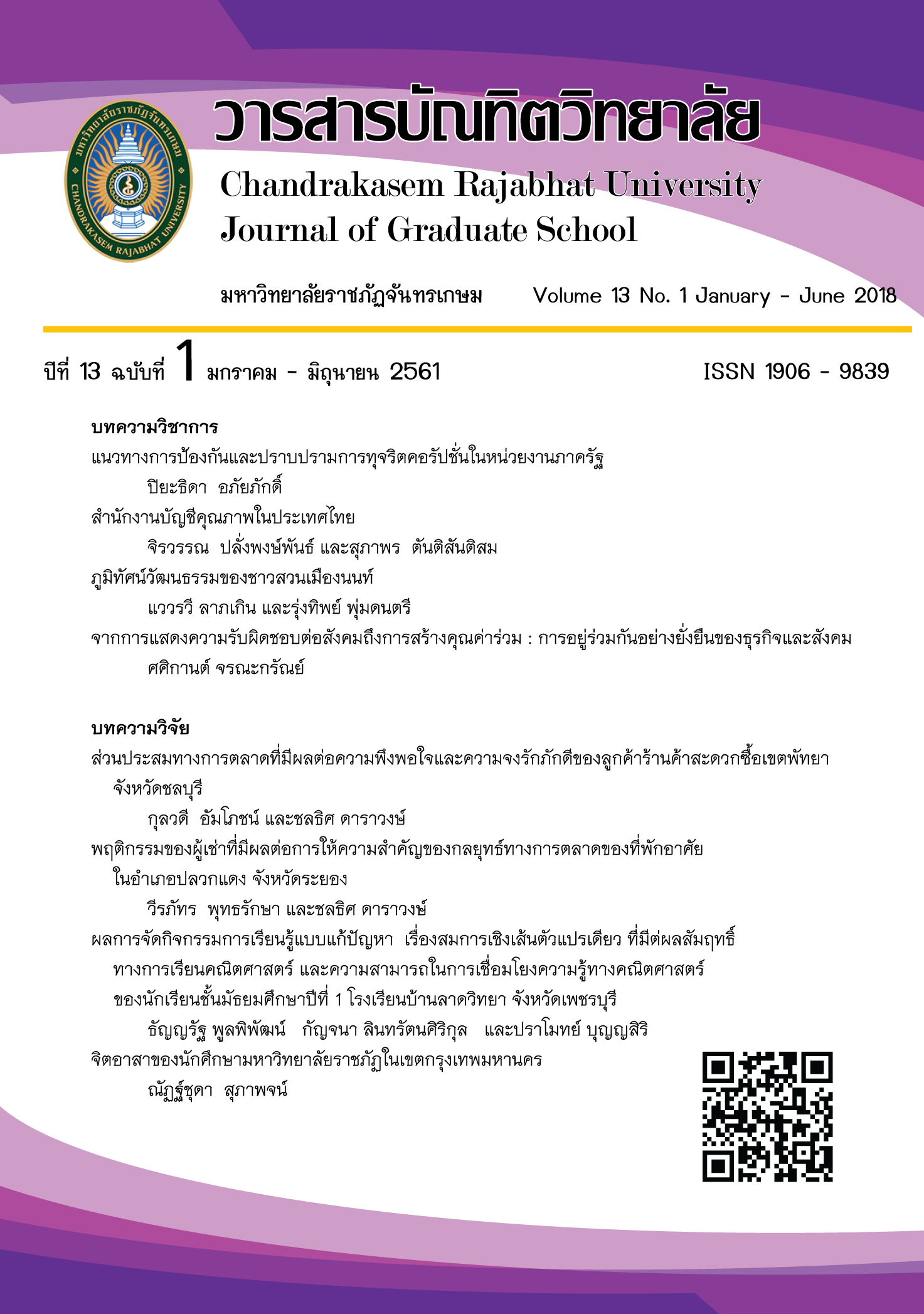The Effects of Problem Solving Learning Activities in the Topic of Linear Equations with One Variable on Mathematics Learning Achievement and Mathematics Connection Ability of Mathayom Suksa I Students at Ban Lat Wittaya School in Phetchaburi Province
Main Article Content
Abstract
The purposes of this research were (1) to compare mathematics learning achievements in the topic of Linear Equations with One Variable of Mathayom Suksa I students learning with the use of problem solving activities with that of students learning under conventional teaching; and (2) to compare mathematics connection ability of Mathayom Suksa I students learning with the use of problem solving activities with that of students learning under conventional teaching. The research sample consisted of 30 Mathayom Suksa I students in two intact classrooms obtained by cluster random sampling from Mathayom Suksa I students studying in the first semester of the 2015 academic year at Ban Lat Wittaya School in Phetchaburi Province. The employed research instruments consisted of (1) mathematics learning management plans on the topic of Linear Equations with One Variable with the use of problem solving activities; ( 2) mathematics learning management plans on the topic of Linear Equations with One Variable under conventional teaching; (3) an achievement test on the topic of Linear Equations with One variable; and (4) a mathematics connection ability test. Statistics employed for data analysis was the t-test.
Research finding revealed that (1) mathematics learning achievement of students learning with the use of problem solving activities was significantly higher than that of the students learning under conventional teaching at the .05 level of statistical significance; and (2) mathematics connection ability of students learning with the use of problem solving activities was significantly higher than that of the students learning under conventional teaching at the .05 level of statistical significance.
Article Details
References
รูปแบบการแก้ปัญหาที่มีต่อความสามารถในการแก้ปัญหาเชิงสร้างสรรค์และผลสัมฤทธิ์ทางการเรียน
คณิตศาสตร์ของนักเรียนมัธยมศึกษาปีที่ 3. (วิทยานิพนธ์ ปริญญามหาบัณฑิต). กรุงเทพฯ:
จุฬาลงกรณ์มหาวิทยาลัย.
รุ่งฟ้า จันท์จารุภรณ์. (2554). กิจกรรมส่งเสริมทักษะและกระบวนการทางคณิตศาสตร์ ในประมวลสาระ
ชุดวิชาการจัดประสบการณ์การเรียนรู้คณิตศาสตร์ หน่วยที่ 9. นนทบุรี: บัณฑิตศึกษา
มหาวิทยาลัยสุโขทัยธรรมาธิราช สาขาวิชาศึกษาศาสตร์.
สถาบันส่งเสริมการสอนวิทยาศาสตร์และเทคโนโลยี. (2556). คู่มือการใช้หลักสูตร กลุ่มสาระการเรียนรู้
คณิตศาสตร์ ระดับชั้นประถมศึกษา ที่ 4 – 6. สืบค้น 23 ตุลาคม 2560,
จาก http://www.ipst.ac.th/files/curriculum2556/ManualMathP4-P6.pdf.
สุคนธ์ สินธพานนท์. (2550). สุดยอดวิธีการสอนสังคมศึกษา ศาสนาและวัฒนธรรม นำไปสู่การจัดการเรียนรู้ของ
ครูยุคใหม่. กรุงเทพฯ: อักษรเจริญทัศน์.
สุณิสา สุมิรัตนะ. (2555). การพัฒนากระบวนการเรียนการสอนเพื่อส่งเสริมการรู้คณิตศาสตร์ของนักเรียน
มัธยมศึกษาตอนต้น โดยใช้แนวคิดการศึกษาคณิตศาสตร์ที่เชื่อมโยงกับชีวิตจริงและกระบวนการ.
(วิทยานิพนธ์ ปริญญาดุษฎีบัณฑิต). กรุงเทพฯ: จุฬาลงกรณ์มหาวิทยาลัย.
อัมพร ม้าคนอง. (2553). ทักษะและกระบวนการทางคณิตศาสตร์: การพัฒนาเพื่อพัฒนาการ. กรุงเทพฯ:
โรงพิมพ์แห่งจุฬาลงกรณ์มหาวิทยาลัย.
Burks, L. Cl. (1994). The Use of Writing as a Means of Teaching Eight Grade Students to Use Executive
Processes and Heuristic Strategies to Solve Mathematics Problem. Dissertation Abstracts International,
54(11): 4019A – 4020A.

